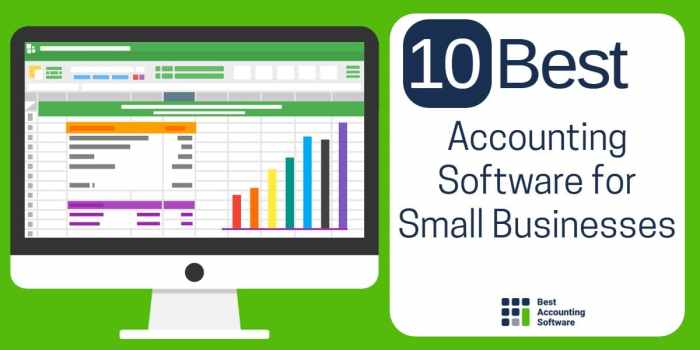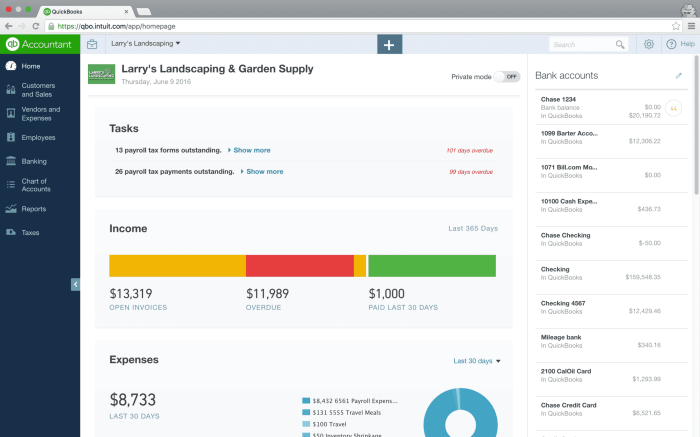Navigating the vast landscape of small business accounting software can be a daunting task, especially when you’re on a tight budget. But fear not! This guide will provide you with all the essential information you need to find the most affordable and effective accounting solution for your small business.
We’ll delve into the key features to look for, compare pricing and value propositions, and discuss user-friendliness, integrations, customer support, and additional considerations. By the end of this guide, you’ll be equipped to make an informed decision and choose the cheapest small business accounting software that meets your specific needs.
Features and Functionality

Small business accounting software should provide a range of essential features to help businesses manage their finances effectively. These features include:
Income and expense tracking: This allows businesses to record all of their income and expenses, including sales, purchases, and payroll.
Invoicing and billing: This allows businesses to create and send invoices to customers, as well as track payments.
Bank reconciliation: This allows businesses to compare their bank statements to their accounting records to ensure that they are accurate.
Financial reporting: This allows businesses to generate financial reports, such as balance sheets, income statements, and cash flow statements.
There are a number of different small business accounting software packages available, each with its own set of features. Some of the most popular packages include:
- QuickBooks
- Sage 50cloud
- Xero
- FreshBooks
When choosing a small business accounting software package, it is important to consider the features that are most important to your business. You should also consider the cost of the software, as well as the level of support that is available.
Cloud-based access and mobile compatibility:
Cloud-based accounting software allows businesses to access their financial data from anywhere with an internet connection. This can be very convenient for businesses that have employees who work remotely or who travel frequently.
Mobile compatibility allows businesses to access their financial data from their smartphones or tablets. This can be very useful for businesses that need to track their finances on the go.
Pricing and Value
The cost of small business accounting software can vary significantly, depending on the features and functionality offered. It’s essential to compare the pricing of different options to find one that fits your budget and needs.
In addition to the initial purchase price, you may also need to consider ongoing costs, such as monthly subscription fees, support fees, or training costs. Some software may offer a free trial or money-back guarantee, which can give you an opportunity to try the software before you commit to a purchase.
Value Proposition
When evaluating the value of small business accounting software, it’s important to consider the features and support offered. Some software may offer more advanced features, such as inventory management or project tracking, while others may focus on simplicity and ease of use.
It’s also important to consider the level of support offered by the software provider. Some providers offer 24/7 support, while others may only offer limited support during business hours. The level of support you need will depend on the complexity of your accounting needs and your comfort level with using accounting software.
User Interface and Usability
A user-friendly interface is crucial for small business accounting software. Small business owners often have limited time and resources, so they need software that is easy to learn and use. Intuitive dashboards and simple navigation can make a big difference in the efficiency of accounting tasks.
Training and Support Resources
Training and support resources are also important for user satisfaction. Software that comes with comprehensive documentation, tutorials, and online support can help users get up to speed quickly and resolve any issues they may encounter.
Integrations and Compatibility

Integrating accounting software with other business tools can streamline operations, automate tasks, and enhance data accuracy. Seamless integrations with popular customer relationship management (CRM) systems, e-commerce platforms, and payment processing solutions enable businesses to manage customer interactions, track sales, and process transactions efficiently.
Compatibility with Operating Systems and Devices
Compatibility with different operating systems and devices is crucial for remote work and accessibility. Software that supports multiple operating systems, such as Windows, macOS, and Linux, ensures that users can access their accounting data from any device, regardless of their location or device preferences.
Customer Reviews and Support

Customer reviews and testimonials provide valuable insights into the satisfaction of users with different small business accounting software. Positive reviews indicate that users are happy with the software’s features, functionality, and ease of use, while negative reviews can highlight areas where the software falls short.
In addition to customer reviews, it is important to evaluate the quality and responsiveness of customer support provided by each software vendor. A reliable customer support team can help users troubleshoot problems, answer questions, and provide guidance on using the software effectively.
Online Forums and Community Support
Many small business accounting software vendors offer online forums and community support, where users can connect with each other to share tips, ask questions, and get help from other users. These forums can be a valuable resource for users who need assistance with the software or who want to learn from others who are using it.
Additional Considerations
When choosing small business accounting software, it is important to consider additional factors beyond the core features and functionality. These include scalability, industry-specific requirements, and ease of use.Scalability is essential for businesses that expect to grow in the future. The software should be able to handle an increasing number of transactions, customers, and employees without becoming overwhelmed.
It should also be able to integrate with other software applications, such as CRM and ERP systems, as the business grows.Industry-specific requirements are also important to consider. Some businesses have unique accounting needs that require specialized software. For example, a law firm may need software that can track billable hours, while a construction company may need software that can track project costs.Finally,
the software should be easy to use for both accountants and non-accountants alike. The interface should be intuitive and the software should be well-documented. This will help to ensure that the software is used effectively and that data is entered accurately.
Closing Summary
Choosing the right accounting software for your small business is crucial for streamlining your financial operations, saving time and money, and gaining valuable insights into your business performance. By carefully considering the factors Artikeld in this guide, you can find the cheapest software that provides the essential features, ease of use, and support you need to succeed.
Remember, investing in the right accounting software is an investment in the future growth and profitability of your business.

